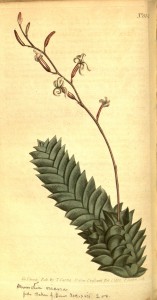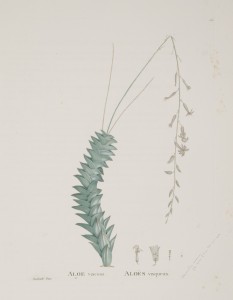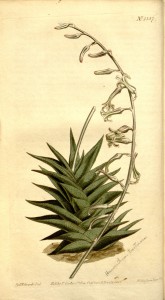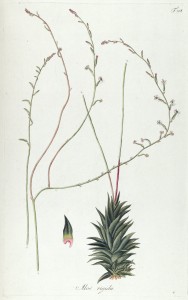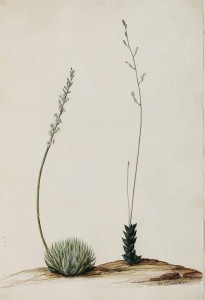57. Haworthia viscosa (L.) Haw., Syn.Pl.Succ. :90(1812). Bayer :167(1976). Scott, Nat.Cact.Succ.J 36:98(1981). Bayer :78(1982). Scott :26(1985). Aloe viscosa L. Spec.Plant. :460(1753). Haw., Trans.Linn.Soc. 7:6(1804). Type: icon, 82:t31, Commelin, Prael.Bot. (1703). Epitype (B&M): Blackburn Valley, Calitzdorp, Barker 5073 (NBG): H. viscosa var. pseudotortuosa (Salm Dyck) Baker, J.Linn.Soc.Bot. 18:200(1880). Aloe pseudotortuosa Salm Dyck, Cat.Rais. :8(1817). H. pseudotortuosa (Salm Dyck) Haw., Suppl.Pl.Succ. :59(1819). Aloe subtortuosa Salm Dyck, Monogr. 3:t5(1836). Type: Not known. Neotype: icon. 3:t5, Salm Dyck: H. tortuosa Haw., Syn.Pl.Succ. :90(1812). Baker, J.Linn.Soc.Bot. 18:201(1880). Aloe tortuosa Haw., Trans.Linn.Soc. 7:7(1804). Salm Dyck, Monogr. 4:t2(1836). Type: Cape, Lewis. Not preserved: Neotype: Icon. 3:t5, Salm Dyck: H. concinna Haw., Suppl.Pl.Succ. :59(1819). Aloe tortuosa var. major Salm Dyck, Cat.Rais. :8(1817). A. concinna (Haw.) Roem. et Schultes, Syst.Veg. 7:653(1829). Salm Dyck, Monogr. 3:t4(1836). H. viscosa var. concinna (Haw.) Baker, J.Linn.Soc.Bot. 18:200(1880). Type: Not preserved. Neotype: icon. 3:t4, Salm Dyck: H. asperiuscula Haw. Suppl.Pl.Succ. :60(1819). Aloe asperiuscula (Haw.) Salm Dyck, Monogr. 3:t2(1836). Type: Not preserved. Neotype: icon. 3:t2, Salm Dyck: H. cordifolia Haw., Suppl.Pl.Succ. :60(1819). Aloe cordifolia (Haw.) Salm Dyck, Monogr. 3:t1(1836). Type: Not preserved. Neotype: icon. 3:t1, Salm Dyck: H. indurata Haw., Rev.Pl.Succ. :49(1821). Aloe viscosa var. indurata (Haw.) Salm Dyck, Monogr. 3:t3a(1836). H. viscosa var. indurata (Haw.) Baker, J.Linn.Soc.Bot. 18:200(1880). Type: Not preserved. Neotype: icon. 3:t3a, Salm Dyck: H. viscosa var. major Haw., Revis. :49(1821). Type: Not preserved: H. viscosa var. minor ibid.: H. viscosa var. parvifolia ibid.: H. torquata Haw., Phil.Mag. 1:123(1827). H. viscosa var. torquata (Haw.) Baker, J.Linn.Soc.Bot. 18:201(1880). Aloe torquata (Haw.) Salm Dyck, Monogr.3:t6(1836). Type: Not preserved. Neotype: icon. 3:t6, Salm Dyck: H. viscosa var. subobtusa V.Poelln., Feddes Repert.Spec.Nov. 44:240(1938). Type: Cape, Aberdeen, Wilke in Triebn.1152. Not preserved: H. viscosa var. caespitosa idem. Type: Cape, Ladismith, Vensterkrans, La Grange in Triebn.1151. Not preserved: H. beanii Smith, JS.Afr.Bot. 10:137(1945). Type: Cape, Ferndale, Courtenay-Latimer in Smith 3189 (NBG): H. beanii var. minor ibid. :138. Type: Cape, Ferndale, Courtenay-Latimer in Smith 3678 (NBG): H. viscosa var. cougaensis Smith, JS.Afr. Bot. 11:65(1945). Type: Cape, Willowmore, Smith 2902 (NBG): H. viscosa var. viridissima idem. :67. Type: Cape, Steytlerville, Smith 2915 (NBG): H. asperiuscula var. subintegra ibid. :68(1945). Type: Cape, Ladismith, Smith 5369 (NBG): H. asperiuscula var. patagiata ibid. 12:11(1946). Type: Cape, Willowmore, Smith 2176 (NBG): H. viscosa var. quaggaensis ibid. 14:46(1948). Type: Cape, Humansdorp, Smith 2937 (NBG).
viscosa: sticky.
Rosette caulescent, proliferous, to 300mm tall. Leaves to 50 X 15mm, closely adnate, spreading, deltoid, arranged trifariously, surfaces scabrid, pungent tips. Inflorescence sparsely branched, lax. Flowers tepals fused, tube straight, lower inner tepals revolute.
1982 – The large number of synonyms may exaggerate the variability of this species. Smith had selected approximately 15 further variants which he intended describing. H. viscosa is very widely distributed in the eastern, central and southern Karoo, and Little Karoo. It also extends into the lower Gamtoos valley, sometimes occurring in fynbos vegetation. The chief characteristic of the species is its trifarious leaf arrangement ‑ a characteristic shared strictly with H. nigra. The leaves are scabrous rather than tubercled as in H. nigra. The degree of secondary spiralisation of the three vertical leaf tiers varies, as does the closeness with which the leaves are packed into each other on the stems. These two factors coupled with size and colour account for the vast majority of variants. Very often the overriding factor is simply a question of growing conditions. H. viscosa does hybridise with several species. The hybrid with H. scabra gave rise to H. tauteae while the hybrid with H. longiana was undescribed. An unusual population in the Baviaanskloof has short stems and glaucous leaves. H. viscosa is proliferous from the base, slow growing, but easy to grow in cultivation.
1999 – Haworth wrote in 1821, “A little difference in soil, culture and age, often make a great one in the face and appearances of succulent plants; and it requires consummate skill, and unwearied attention, to decide on every occasion with complete success. And more especially from those who cannot keep alive, and in perfect health, a good collection of their own; whose flowers it requires no favour to dissect, and carry away, for further study.” H. viscosa is a slow growing species and not very popular in collections. This is despite it being a very handsome species in its own right. The form described as H. beanii by Smith may be sufficiently distinctive for varietal status. There are indications that the rugged terrain of the Baviaanskloof may hold several such odd forms. Hybrids between H. viscosa and H. glauca var. herrei are known in the Steytlerville area.
Distribution: 3220 (Sutherland): 43km N. Laingsburg (-DD), Bruyns 2934 (BOL), Bayer 2117, 2131 (NBG). 3224(Graaff Reinett): Basal slopes mt. (-AB), Galpin 10276 (PRE); Graaff Reinet (-AB), Marloth 4205 (PRE), Sister Tarcisia 13 (PRE), Thode A 622 (PRE), Thode 23976 (NBG); Tandjiesberg (-BC), Bruyns 2969 (NBG). 3320(Montagu): Matjesfontein (-BA), Compton 15241 (NBG); Laingsburg (-BB), C.A. Smith 2507 (PRE). 3321 (Ladismith): W. Ladismith (-AC), Smith 6786 (NBG); Gamkapoort, Varsfontein (-BC), Bruyns 2911 (BOL), Laidler 684 (NBG); Ockertskraal (-CA), Smith 6992 (NBG), Bohnen 8732 (NBG), Laidler 491 (NBG); S. Ladismith (-CA), Smith 5369, 7142, 7143 (NBG); S. Ladismith (-CB), Smith 5369 (BOL, NBG, PRE); S. Vanwyksdorp (-CB), Smith 6890 (NBG); S. Ladismith (-CC), Smith 7137 (NBG); Calitzdorp (-DA), Smith 2178, 2179 (NBG), Blackburn in NBG5/30 (NBG); Blackburn Valley, Calitzdorp (‑DA), Smith 5073 (NBG); Gamka Mt. Reserve (-DA), Lloyd 1007 (NBG); Rietvlei (-DA), Oliver 5283 (NBG); W. Oudtshoorn (-DB), Smith 834, 2171, 2177 (NBG). 3322 (Oudtshoorn): Tierberg (-AB), Bruyns 2881 (BOL); E. Klaarstroom (-AD), Smith 2174 (NBG); Klaarstroom (-BC), Smith 2934 (NBG); Klaarstroom to Vondeling (-BC), Smith 6214 (NBG); W. Vondeling (BD), Smith 2911 (NBG); Klaarstroom to Vondeling (-BD), Smith 6213 (NBG); Minwater (-CA), Smith 2913, 2939 (NBG). 3323(Willowmore): Slypsteenberg (-AB), Fourcade 4975a (BOL); Towerpoort (-AC), Peers (NBG); Vondeling (-AC), Smith 830, 841 (NBG); Between Klaarstroom and Traka river (-AD), Burtt‑davy 12713 (PRE); SE. Willowmore (-AD), Smith 3661 (NBG); S. Georgida (-AD), Smith 3664 (NBG); Redcliffe (-BA), Bruyns 7054 (BOL); E. Willowmore (-BA), Smith 2176 (NBG); De Hoop, Miller (-BB), Schoeman (NBG); Miller (-BB), Smith 5659 (NBG); NE. Willowmore (-BB), Smith 835, 2176, 6862 (NBG), Compton 20324 (NBG); Fullerton to Steytlerville (-BD), Smith 6215 (NBG); Deugas (-CA), Smith 3663 (NBG); S. Uniondale Road Stn. (-CA), Fourcade 5385 (BOL). 3324 (Steytlerville): Campherpoort (-AA), Smith 3645, 3647, 3653, 7045 E. Steytlerville (-AD), Smith 2915 (NBG); 19km SE. Steytlerville (-BC), Smith 2915 (BOL, NBG, PRE); Kleinpoort (-BD), Smith 6216 (NBG); Couga to Zandvlakte (-CA), Smith 2902 (NBG, PRE); Kouga, Ziewefontein (-CB), Fourcade 3130 (BOL); Cambria to Zandvlakte (-CB), Smith 2928, 2902 (NBG); Heimersriver (-CD), Smith 2884 (NBG); Quagga (-DA), Smith 2937 (NBG); Cambria (-DA), Smith 2938 (NBG); Mistkraal (-DA), Smith 7093, 7101, 7104 (NBG); Ouplaas (-DB), Bruyns 7044 (BOL); Ferndale (-DB), Smith 284, 3187, 3188, 3678, 5673, 7068 (NBG), Smith in PRE 34821, Courtenay-Latimer in Smith 3678 (NBG), Smith 3189 (NBG,PRE); Quagga to Cambria (-DD), Smith 2937 (NBG).
Inadequately located: Prince Albert, Bolus 11650 (BOL), Tugwell (BOL); Graaf Reinet, Bolus 559 (BOL); Redhouse, Paterson 42 (BOL); Calitzdorp, Blackburn (BOL).


Haworthia viscosa JDV94/107 Kleynshoogte. Smith was, according to his unpublished records, proposing another 15 varieties of this species. The synonymy should be taken to indicate the variability of the species in the discard of varieties. 
Haworthia viscosa JDVsn. Gamka East. Very common and widespread, and hybridizing with several other species. 
Haworthia viscosa JDVsn. south of Calitzdorp. Sometimes the sheathing part of the leaf may be lengthened.

